News

Study shows that in HER2 positive early breast cancer 6 months treatment with Herceptin is as good as 12 months for preventing cancer return
NIHR Cambridge BRC and CRUK breast cancer study could help patients and save millions of pounds worldwide.Read more
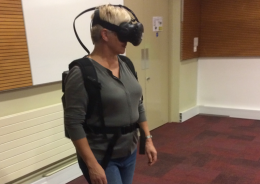
Virtual reality can spot navigation problems in early Alzheimer’s disease
Virtual reality (VR) can identify early Alzheimer’s disease more accurately than ‘gold standard’ cognitive tests currently in use, suggests new research.Read more

Discovery of genetic variants that protect against obesity and type 2 diabetes could lead to new weight loss medicines
Around four million people in the UK carry genetic variants that protect them from obesity, type 2 diabetes and heart disease, suggests new research from the University of Cambridge.Read more

Additional routine ultrasounds benefit mothers and babies, and could save costs, study finds
A study led by researchers at the University of Cambridge and published this week in PLOS Medicine has found that offering universal late pregnancy ultrasounds at 36 weeks’ gestation eliminates Read more

New diet and activity research collaboration tackles obesity and chronic disease challenge
The nation’s world-leading researchers in nutrition and physical activity have pledged to work together to tackle challenges associated with obesity and sedentary behaviours. Read more

Clinical trial launch for new prostate biopsy device
A device developed by a Cambridge researcher to make prostate biopsies safer has begun clinical trials.
University of Cambridge and Cambridge University Hospitals (CUH) researcher and urologist, Mr Vincent Gnanapragasam (right), first developed Read more

Recruitment target success in rheumatoid arthritis prevention trial
The research team behind a clinical trial to investigate a preventative therapy for rheumatoid arthritis are greatly encouraged after exceeding their patient recruitment target.
The study, supported by the NIHR Joint Translational Research Read more
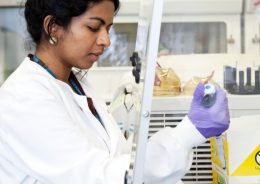
Diagnosis and treatment of rare diseases given boost through grant win
A project to help with the identification, diagnosis and treatment of the one in 17 people in the UK who have a rare disease in the UK has won a £400,000 grant.
Working Read more

Could Virtual Reality help detect the earliest stages of Alzheimer’s disease?
Researchers at the University of Cambridge, supported by the NIHR Cambridge Biomedical Research Centre (BRC), have begun a large-scale study to see if virtual reality (VR) headsets can help spot Alzheimer’s Disease years Read more

Brain training app improves users’ concentration, study shows
A new ‘brain training’ game designed by researchers at the University of Cambridge improves users’ concentration, according to new research published. The scientists behind the venture say this could provide a welcome antidote Read more
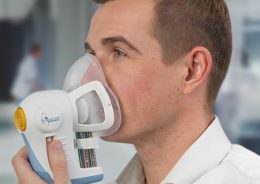
Clinical trial launches to develop breath test for multiple cancers
Researchers have launched a clinical trial to develop a breath test, analysing molecules that could indicate the presence of cancer at an early stage. This is the first test of its kind to Read more
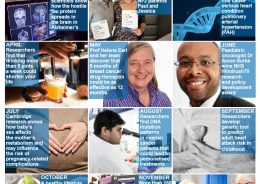
A year in highlights
As 2018 draws to a close, we reflect on the busy year our researchers have had.
We have looked back and picked some of our important research stories from the year.
Click on Read more

HRH The Duchess Of Cornwall visits Cambridge CRF to see the artificial pancreas
Her Royal Highness The Duchess of Cornwall visited Addenbrooke’s Hospital on Tuesday 27 November to see the world-leading type 1 diabetes technology being developed there by Professor Roman Hovorka of the University of Cambridge.
The Read more
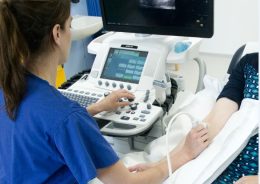
Kidney dialysis patients needed for Cambridge research study
Cambridge researchers, with support from NHS Blood and Transplant Clinical Trials Unit and funded by the National Institute for Health Research, are asking patients with failing kidneys who opt to have a fistula Read more

A healthy lifestyle cuts stroke risk, irrespective of genetic risk
People at high genetic risk of stroke can still reduce their chance of having a stroke by sticking to a healthy lifestyle, in particular stopping smoking and not being overweight, Read more

Brain training app helps reduce OCD symptoms, study finds
A ‘brain training’ app could help people who suffer from obsessive compulsive disorder (OCD) manage their symptoms, which may typically include excessive handwashing and contamination fears.
In a study published Read more

Many cases of dementia may arise from non-inherited DNA ‘spelling mistakes’
Only a small proportion of cases of dementia are thought to be inherited – the cause of the vast majority is unknown. Now, in a study published today in the journal Nature Communications, Read more

Genetic tool to predict adult heart attack risk in childhood
People at high risk of a heart attack in adulthood could be spotted much earlier in life with a one-off DNA test, according to new research part-funded by the British Heart Foundation and Read more

NIHR researcher nominated for The Sun’s Who Cares Wins health awards
NIHR-funded researcher Professor Roman Hovorka has been nominated for the Groundbreaking Pioneer or Discovery category of The Sun’s Who Cares Wins health awards for his research developing an artificial pancreas for people with Read more

The UK’s leading mental health experts unite to solve treatment challenges
The country’s top mental health researchers and clinicians are joining forces to solve some of the greatest mental health challenges facing the UK public.
The group of investigators, based in leading universities and Read more


